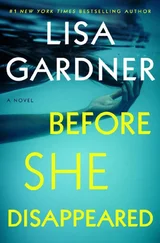Lisa Gardner - Gone
Здесь есть возможность читать онлайн «Lisa Gardner - Gone» весь текст электронной книги совершенно бесплатно (целиком полную версию без сокращений). В некоторых случаях можно слушать аудио, скачать через торрент в формате fb2 и присутствует краткое содержание. Жанр: Триллер, на английском языке. Описание произведения, (предисловие) а так же отзывы посетителей доступны на портале библиотеки ЛибКат.
- Название:Gone
- Автор:
- Жанр:
- Год:неизвестен
- ISBN:нет данных
- Рейтинг книги:4 / 5. Голосов: 1
-
Избранное:Добавить в избранное
- Отзывы:
-
Ваша оценка:
Gone: краткое содержание, описание и аннотация
Предлагаем к чтению аннотацию, описание, краткое содержание или предисловие (зависит от того, что написал сам автор книги «Gone»). Если вы не нашли необходимую информацию о книге — напишите в комментариях, мы постараемся отыскать её.
A terrifying woman-in-jeopardy plot propels Gardner's latest thriller, in which child advocate and PI Lorraine "Rainie" Conner's fate hangs in the balance. Rainie, a recovering alcoholic with a painful past (who previously appeared in Gardner's The Third Victim, The Next Accident and The Killing Hour) is kidnapped from her parked car one night in coastal Oregon. The key players converge on the town of Bakersville to solve the mystery of her disappearance: Rainie's husband, Quincy, a semiretired FBI profiler whose anguish over Rainie undercuts his high-level experience with kidnappers; Quincy's daughter, Kimberley, a rising star in the FBI who flies in from Atlanta; Oregon State Police Sgt. Det. Carlton Kincaid; local sheriff Shelly Atkins; and abrasive federal agent Candi Rodriguez, who specializes in hostage negotiation. Gardner suspensefully intercuts the complicated maneuvering of this bickering team with graphic scenes of Rainie bravely struggling with her violent, sadistic captor. When the rescuers make a misstep, he raises the stakes by snatching a troubled seven-year-old foster child named Dougie, who's one of Rainie's cases. The cat-and-mouse intensifies, as does the mystery of the kidnapper's identity. Sympathetic characters, a strong sense of place and terrific plotting distinguish Gardner's new thriller.
***
When someone you love vanishes without a trace, how far would you go to get them back?
For ex-FBI profiler Pierce Quincy, it's the beginning of his worst nightmare: a car abandoned on a desolate stretch of Oregon highway, engine running, purse on the driver's seat. And his estranged wife, Rainie Conner, gone, leaving no clue to her fate.
Did one of the ghosts from her troubled past finally catch up with Rainie? Or could her disappearance be the result of one of the cases they'd been working-a particularly vicious double homicide or the possible abuse of a deeply disturbed child Rainie took too close to heart? Together with his daughter, FBI agent Kimberly Quincy, Pierce is battling the local authorities, racing against time and frantically searching for answers to all the questions he's been afraid to ask.
One man knows what happened that night. Adopting the moniker from an eighty-year old murder, he has already contacted the press. His terms are clear: he wants money, he wants power, he wants celebrity. And if he doesn't get what he wants, Rainie will be gone for good.
Sometimes, no matter how much you love someone, it's still not enough.
As the clock winds down on a terrifying deadline, Pierce plunges headlong into the most desperate hunt of his life, into the shattering search for a killer, a lethal truth, and for the love of his life who may forever be.gone.
***
When someone you love vanishes without a trace, how far would you go to get them back?
For ex-FBI profiler Pierce Quincy, it's the beginning of his worst nightmare: a car abandoned on a desolate stretch of Oregon highway, engine running, purse on the driver's seat. And his estranged wife, Rainie Conner, gone, leaving no clue to her fate.
Did one of the ghosts from her troubled past finally catch up with Rainie? Or could her disappearance be the result of one of the cases they'd been working-a particularly vicious double homicide or the possible abuse of a deeply disturbed child Rainie took too close to heart? Together with his daughter, FBI agent Kimberly Quincy, Pierce is battling the local authorities, racing against time and frantically searching for answers to all the questions he's been afraid to ask.
One man knows what happened that night. Adopting the moniker from an eighty-year old murder, he has already contacted the press. His terms are clear: he wants money, he wants power, he wants celebrity. And if he doesn't get what he wants, Rainie will be gone for good.
Sometimes, no matter how much you love someone, it's still not enough.
As the clock winds down on a terrifying deadline, Pierce plunges headlong into the most desperate hunt of his life, into the shattering search for a killer, a lethal truth, and for the love of his life who may forever be.gone.












